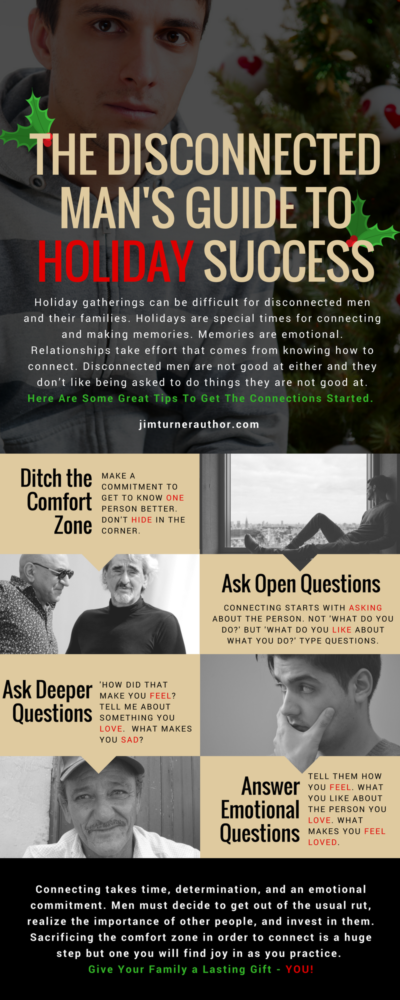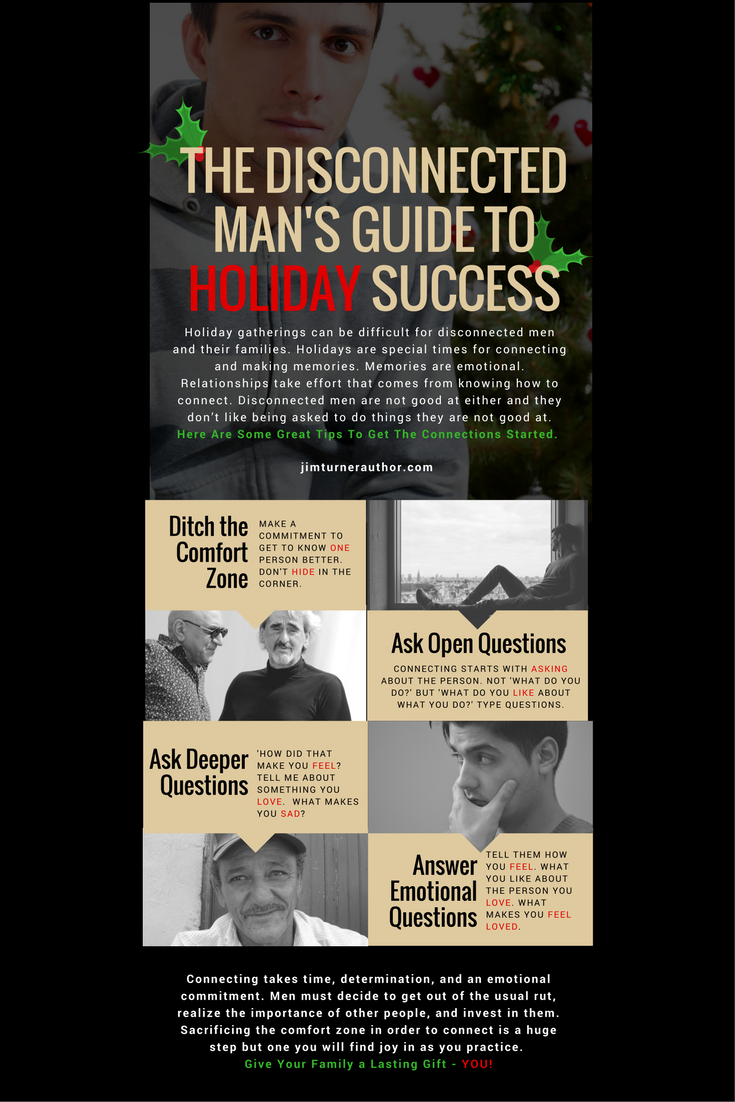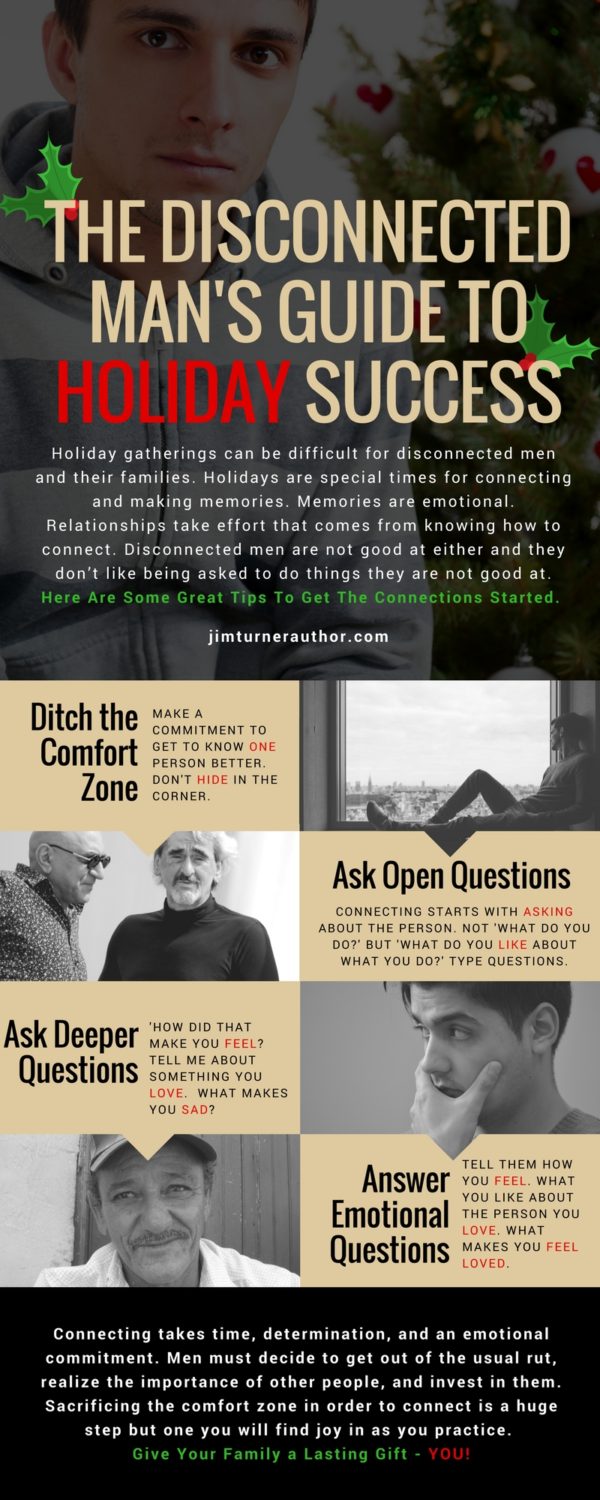Holiday gatherings can be difficult for disconnected men and their families. Spending extended time with family and friends, some they rarely see, can be very challenging. Holidays are special times for connecting and making memories. Memories are emotional. Relationships take effort that comes from knowing how to connect. Disconnected men are not good at either and they don’t like being asked to do things they are not good at.
That puts everyone in a tough place. The disconnected man usually finds his way into a corner and sits there watching everyone else. If someone ventures over to talk to him, he’s ok with that, but he’s usually not interested in talking about anything in depth. He will tell you what he’s been doing and how the kids are, but you won’t know how he really feels about it all. Except that he’ll say it’s all great. It can be disappointing to those who would like to get to know him better. He attends gathering after gathering and is happy he can do his duty but no one leaves with the impression that they got to know him any better. It’s a bit tragic. But it doesn’t have to be this way.
If you are a disconnected man or if you will be attending holiday gatherings with one, wouldn’t you like this year to be different? Let’s look at a few tips to get you started. Important – if you just learned about being disconnected and this is your first try at connecting – take it slowly. Don’t expect too much of yourself. You will grow into this but you have to give it time.
Here we go.
Refuse the Comfort Zone: You know what I mean. That place you are thinking about right now. That corner or back room or shop or safe person who will make it easy on you. The place where you can hide or the person who won’t challenge you too much. You always go there during family gatherings. This year – change it up.

You may not want to sit next to Aunt Wanda – the one who probes and meddles. But can you venture out a little and talk to someone you don’t know well. What about the awkward teenager who is sitting in the other corner? Or the new boyfriend or girlfriend of one of the nieces or nephews? Someone you can practice with.
Once you’ve determined to challenge yourself and move out of your comfort zone – what then?
First Step: Ask questions. This is a great first step and one that’s a bit safer than others you might try. The key is to show interest in someone. You are asking questions not to fill time but to actually learn something interesting about the person you are with. It also initially keeps you from having to say anything about yourself. Try asking questions like, ‘What do you like to do? What is your favorite thing to talk about? Is it easy for you to get to know people? Did you do anything unusual or interesting this year? If you could travel anywhere, where would you go? Why?’
Once you start asking questions, you’ll learn more and more and you’ll think of other questions to ask. Before long, you’ll be having a conversation. You might even find yourself enjoying it. Beware though, conversations and questions lead others to start asking you questions. Did you notice that my sample questions were about more than the weather, or sports, or work? They are not super personal but they sort of open the door to more personal things. People may ask you the same things so be ready to share a little.
This first step is an encouragement to start conversations. You haven’t really shared any emotional information yet. And that’s ok. But eventually you’ll have to take another step.
Second Step: Ask more questions but tweak them a bit. Information is great but emotion is memorable. When someone talks about things they love they get emotional. Ask them questions like, ‘How did that make you feel? or Tell me about something you love. or What makes you sad or happy?’ These questions start to get under the surface and allow you to really get to know the person.
This may seem like a stretch to you or it may seem like you are being fake. Remember that you are making a start. You are practicing things that will help you connect. It may feel uncomfortable for a while, but you will get used to it in time. In time you may even learn to enjoy it and find that knowing about someone’s emotions makes you feel somehow closer to them. Then you know you are making progress.
Third Step: Share something about how you feel. You may talk about someone you love and what you appreciate about them. How they make you feel. What they do to help you feel loved. What your emotional comfort zones are and what crosses into forbidden territory.
Important point – if the conversation veers toward something that makes you uncomfortable – rather than changing the subject, try something different. Tell the person that you are uncomfortable with that subject and may be able to discuss it in the future but can’t right now. That’s connecting! You just let someone know what is sensitive to you without a negative reaction or brushing them off. That’s progress!
Above all, remember it’s the holidays. People who love you want to be with you. They would love to get to know you better and feel closer to you. That’s a good thing. Start now to prepare yourself for closer connections this holiday season. Determine to practice. Determine to be as open as you can. Determine to let others know that you are trying. That you want them to know you love them. You just might change someone’s life this holiday season. And I know deep down inside that’s really what you want to do. Even if it chokes you up a bit to think about it.
Merry Christmas and Happy Connecting!



